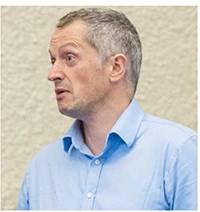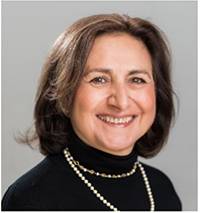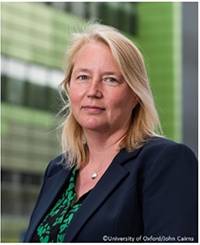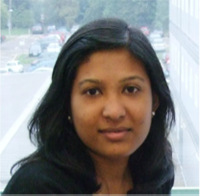The Vax-Hub team, led by UCL and the University of Oxford, brings together world-leading vaccinologists, biochemical, materials and system engineers to deliver an ambitious programme of research.
Vax-Hub Team
Vax-Hub Co-Directors
Professor Martina Micheletti; UCL Biochemical Engineering | Vax-Hub Co-Director
Martina Micheletti is a Professor of Biochemical Engineering at the UCL Department of Biochemical Engineering and an expert in fluid dynamics. She leads UCL vaccine bioprocessing research and studies the influence of the engineering environment on different types of biological organisms in upstream and downstream bioprocessing operations with the aim of addressing key challenges in the scale-up of pharmaceutical processes. She also has expertise in automated microscale technologies, which have been applied successfully to a range of therapeutics including subunit vaccines. Micheletti has received industrial funds from companies including Pfizer, AstraZeneca, Pall Biotech, and Eli Lilly to resolve scaling challenges underpinning antibody and vaccine production processes. She has led the single-use technologies agenda internationally and has experience in the management of international platform grants.
Professor Sarah Gilbert; University of Oxford - Pandemic Sciences Institute | Vax-Hub Co-Director
Dame Sarah Gilbert is a Professor of Vaccinology at Oxford University, where she joined the Nuffield Department of Medicine in 1994 and became part of the Jenner Institute (within NDM) when it was founded in 2005. Her chief research interest is the development of viral vectored vaccines that work by inducing strong and protective T and B cell responses. She leads work on influenza vaccine development and on vaccines for many different emerging pathogens, including Nipah virus, MERS, Lassa virus and CCHF virus. Professor Gilbert’s work also focuses on the rapid transfer of vaccines into GMP manufacturing and first in human trials. She was the Oxford Project Leader for ChAdOx1 nCoV-19, a vaccine against the coronavirus SARS-CoV-2. This vaccine, tested by the University of Oxford in clinical trials of over 23,000 people in the UK, Brazil and South Africa, is now in use in many countries around the world in the fight against the Covid-19 Pandemic.
Grand Challenges Research Team (UCL and Oxford)
Professor Daniel G. Bracewell; UCL Biochemical Engineering
Daniel G. Bracewell is a Professor of Bioprocess Analysis at the UCL Department of Biochemical Engineering. He has made major contributions to the fundamental understanding of biopharmaceutical purification operations, including collaborations with Thailand, India and the USA. He has authored more than 100 peer reviewed journal articles in the area to date and currently supervises 15 doctoral and postdoctoral projects, many of these studies are in collaboration with industry. One such project was the basis from which the spinout Puridify, a nanofibre absorption technology company now owned by Cytiva, was created. He is academic lead for the UCL-Pall Biotech Centre of Excellence.
Professor Eli Keshavarz-Moore; UCL Biochemical Engineering
Eli Keshavarz-Moore is a Professor of Bioprocess Science and Enterprise at the UCL Department of Biochemical Engineering. Her research focuses on the interaction between cell engineering, fermentation and downstream processing. As one of the five principal investigators of IMRC for bioprocessing (2007-2012), she brought a new theme based on the specific, knowledge-based design of cells and their propagation in bioreactors in response to the needs and demands of downstream/purification stages. In further research grants, the challenge of harnessing complex, large plasmids and phages which are potential candidates for a new generation of biopharmaceuticals such as multivalent vaccines and debilitating conditions such as muscular dystrophy has been considered.
Dr Stefanie Frank; UCL Biochemical Engineering
Stefanie Frank is a Lecturer in Synthetic Biology at the UCL Department of Biochemical Engineering. Her research focuses on engineering bacterial nano- and microcompartments for biotechnology applications. As part of the Vax-Hub, Stefanie’s interest lies in generating novel vaccines based on protein nanoparticles and VLPs. She leads the Vaccines Bioprocess Development and Commercialisation MBI® Training course at UCL and is the leader of UCL iGEM, a Synthetic Biology project for undergraduate students.
Dr Sudaxshina Murdan; UCL School of Pharmacy
Sudaxshina Murdan is an Associate Professor at the UCL School of Pharmacy. Her expertise is in optimising the formulation of drugs and vaccines. Current projects include the development of parenteral and mucosal (e.g., sublingual) vaccines for human and veterinary use, specifically vaccines against COVID-19 and Clostridium difficile infections, feed-based vaccines for farmed fish, parenteral vaccines against tick-borne diseases in livestock and the development of metal nanoparticles as antifungal drugs. Sudaxshina teaches undergraduate and postgraduate students in Pharmaceutical Sciences, she is passionate about the research-education interface, and is training students to become global citizens and vaccination champions. She is also working with local authority community engagement officers to help address vaccine hesitancy.
Dr Catherine Green; University of Oxford - Clinical Biomanufacturing Facility (CBF)
Catherine Green is a Fellow of Exeter College, an Associate Professor in the Nuffield Department of Medicine and heads the University of Oxford's Clinical Biomanufacturing Facility (CBF). The CBF is the University's GMP biologics medicines manufacturing facility. Cath's team support the University's academic groups by manufacturing novel innovative medicinal products for early stage clinical trials. Over the last decade, the CBF has produced vaccines for first in human trials, covering diseases including malaria, TB, influenza, MERS, Zika, rabies, plague and Ebola among others. From the start of the Covid-19 pandemic, Professor Green played an integral role as the manufacturing lead in the development of the Oxford Covid-19 vaccine.
Dr Sumi Biswas; University of Oxford – The Jenner Institute
Sumi Biswas is an Associate Professor of Vaccinology at the Jenner Institute at the University of Oxford. She leads a research programme aiming to develop transmission-blocking malaria vaccines, currently focusing on the use of virus-like particles (VLPs) as vaccine technology. The group focuses on the pre-clinical development, GMP manufacture and clinical testing of the promising candidates. Currently, 3 malaria vaccine candidates developed in her group are being tested in clinical trials in the UK and Africa.
Sumi is also the President, Co-founder and Chief Scientific Officer of SpyBiotech Ltd, a company that utilises a unique protein superglue to generate vaccines against infectious disease and cancer.
Grand Challenges Research Team (Spokes)
Professor Brendan Wren; London School of Hygiene and Tropical Medicine (LSHTM)
Brendan Wren is a Professor of Microbial Pathogenesis at the LSHTM’s Department of Infection Biology. He leads a team of scientists investigating glycostructures from bacterial pathogens. This research has been applied through glycoengineering to establish a novel vaccine technology platform to produce low-cost glycoconjugate vaccines. To date, the technology has been used to develop new recombinant Campylobacter, Shigella, Streptococcus pneumoniae, Group A and B Streptococci, Francisella, Burkholderia pseudomallei, Salmonella and E. coli glycoconjugate vaccines. Through VaxHub a prototype pneumococcal vaccine is being upscaled towards GMP. Wren has strong links with most human and animal vaccine companies and is co-founder of ArkVax a LSHTM spin out dedicated to the production of low-cost animal vaccines.
Professor Nicola Stonehouse; University of Leeds
Nicola Stonehouse is a Professor of Molecular Virology at the University of Leeds. She is interested in both the fundamental aspects of the viral lifecycle and the development of novel vaccines. Nicola’s research currently focuses on three major projects: - Picornaviral replication, especially the role of the RNA-dependent RNA polymerase of foot-and-mouth disease virus and processing of the viral polyprotein. This project is funded by BBSRC.
- Design of novel virus-like particle vaccines (e.g., polio and EV71) and design of generic vaccine scaffold systems. This project is funded by WHO.
- Understanding the fundamentals of picornavirus capsid maturation, funded by NIH.
Researchers
- George Bebawy (UCL)
- Artemis Charalambidou (UCL)
- Dr Salome De Sa Magalhaes (UCL)
- Dr Tai Diep (Oxford)
- Reshma Kailath (Oxford)
- Dr Marta Mauri (LSHTM)
- Dr David Mekhaiel (Oxford)
- Dr Yousif Mohamed (UCL)
- Dr Stephen Morris (UCL)
- Anna Olsen (Oxford)
- Dr Amy Pearce (UCL)
- Dr Jessica Swanson (Leeds)
Public and Policy Engagement Team
- Emily Gloinson
- Ludovica Vaiarelli
Professional Services Team
- Jane Doogan
- Laura Pascual Buffone
- Emily Petch
Contact
E: vaxhub@ucl.ac.uk










 Close
Close

